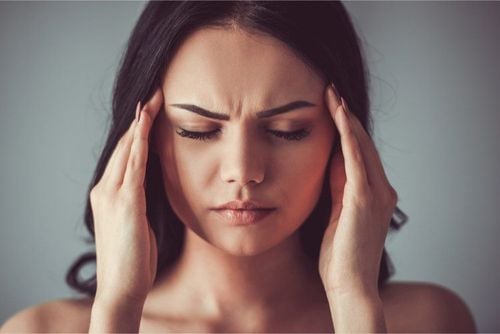This is an automatically translated article.
When the factors that make up a quality sleep are not guaranteed such as insufficient sleep time, difficulty falling asleep, easy to wake up, sluggishness when waking up, insomnia is appearing and disturbing. disturbed human life. Long-term insomnia increases the risk of many dangerous diseases.
1. What is prolonged insomnia?
Sleep is an integral part of our daily lives. Sleep is defined as a naturally occurring, cyclical activity that helps the body recover and prepare for a new, more productive day. During sleep, the human body temporarily suspends motor and sensory activities in a relative way, which is manifested externally by the relaxation of the muscular system and reduced ability to respond to stimuli from the external environment. The average healthy adult sleeps 7 to 8 hours a night, with average sleep time decreasing with age. A quality sleep is defined when it is long enough, deep enough and gives a feeling of well-being after waking up.
Insomnia (English name is insomnia) is a sleep disorder that causes patients to have poor health and mental health, increasing the risk of many different diseases related to the organ systems in the body. body such as nerves and heart. When the factors that make up a quality sleep are not guaranteed such as insufficient sleep time, difficulty falling asleep, easy awakening, sluggishness when waking up, insomnia is appearing and disrupting life. of human. Insomnia that lasts for a long time increases the risk of many more dangerous diseases, so it is necessary to find ways to overcome and stop insomnia. The frequency of insomnia has gradually increased in today's modern society, accounting for more than 30% of the world's population and has not shown any sign of decreasing.

Bệnh mất ngủ làm tăng nguy cơ các bệnh lý khác
2. Causes of prolonged insomnia
So far, insomnia or long-term insomnia have been thought to be the result of psychological stress in life, but the real causes of insomnia are quite diverse. Understanding and identifying the cause of insomnia helps to facilitate the treatment of insomnia and increase the chance of success. Some causes leading to prolonged insomnia can be listed below:
Stress in work and life: This can be considered as the leading cause in modern life today. A lot of work combined with pressures in life can easily cause people to fall into a state of anxiety, and sleep loss is one of the consequences. Young people are the main target in this group of causes. Use of alcohol and stimulants: Alcoholic beverages such as beer or caffeinated beverages such as coffee often stimulate the nervous system and lead to sleep disturbances.

Rượu bia có thể là nguyên nhân của bệnh mất ngủ kéo dài
Drugs: Some groups of drugs can be the cause of long-term insomnia when abused, such as drugs for treating hypertension, corticosteroids, antidepressants,... Time zone difference or unhealthy living habits Reasonable living conditions can also cause insomnia. The living environment is polluted, especially noise pollution caused by vehicles or construction works, disrupting people's sleep. Pathology: Many chronic diseases with symptoms that persist, persist or often appear at night can cause discomfort and insomnia, such as gastritis, gastroesophageal reflux disease, diabetes mellitus, and gastroesophageal reflux disease. This is also one of the common causes of prolonged insomnia, especially in the elderly group.
Insomnia or chronic insomnia is often caused by a combination of many different causes at the same time. Young people of working age who have to deal with long-term insomnia are often subject to a lot of pressure from work and emotional relationships in life, unreasonable lifestyle, often stay up late, abuse alcoholic beverages or stimulants.

Bệnh mất ngủ gây ảnh hưởng đến chất lượng cuộc sống
3. Manifestations of insomnia
Insomnia has many different clinical manifestations, which vary from person to person, but patients can recognize and detect their own sleep disorder through some of the following symptoms:
Pain Headache: Headache often occurs with persistent insomnia as a result of the illness. The cause of headaches in prolonged insomnia is thought to be nerve cells not having enough blood supply, nervous tension. Headaches often appear at night and make insomnia worse, but patients can still experience headaches in the morning after a bad night's sleep. Fatigue, loss of appetite: This is another consequence that can be observed in people suffering from prolonged insomnia. When you don't sleep well, your body can't restore energy, so you often feel tired and lose your appetite.
Insomnia at night: Patients often have difficulty falling asleep, waking up easily in the middle of the night but having difficulty falling back to sleep or waking up early in the morning. Feeling tired, headache, mental tension is often the result of long-term insomnia but can also cause sleep disorders. Insomnia at noon: This is also considered one of the signs suggesting insomnia. The average person should take a daily nap at noon, lasting about 30 to 60 minutes. However, in people with long-term insomnia, mental discomfort and sluggish body, taking a short nap in the noon time frame is also difficult. Memory loss, difficulty concentrating on work and study. This is an alarming sign, at this time long-term insomnia has really affected the quality of life and should be treated as soon as possible. Accompanying psychological disorders: Prolonged insomnia is one of the risk factors that increase the likelihood of neuropsychiatric disorders, in which depression is quite common.

Bệnh mất ngủ gây ra những cơn đau đầu
4. Solution for long-term insomnia treatment
Based on the duration of the disease, insomnia is divided into two large groups: acute insomnia occurring in a short time from a few days to a few weeks and long-term insomnia. The first case can be overcome when the patient changes their lifestyle, diet and minimizes stress in life without using drugs or interventional treatments. On the contrary, the latter case often leads to serious complications, reducing quality of life, so the search for solutions to treat long-term insomnia should be focused and implemented effectively. Measures should be taken as follows:
Find the cause of long-term insomnia: Each person who unfortunately suffers from insomnia has separate causes. Medical staff need to exploit information related to the patient's occupation, living environment and psychological trauma, medical history to search for possible causes. Eliminating the cause of prolonged insomnia helps to orient and increase the effectiveness of treatment, although determining the cause of the disease is not easy to do in all cases.
Change diet: This is a long-term non-drug treatment solution for insomnia that is trusted and implemented by many people. Some foods have the effect of improving sleep quality and are easy to find in daily life such as green bananas, honey water, lotus seeds, sage flowers, ... Regular exercise: Many Research has been done to demonstrate the benefits of regular physical exercise such as maintaining a healthy weight, increasing circulation throughout the body, relieving stress and improving sleep. Practicing yoga and sitting meditation are subjects often chosen in practice. Acupuncture: this is a movement that helps to increase blood circulation, clear the meridians and improve insomnia in a comprehensive way. The mechanism of action of acupuncture is explained by the release of endogenous substances such as serotonin, endorphins that help relax, calm and relieve pain, reduce stress and fall asleep more easily.

Châm cứu giúp cải thiện giấc ngủ
Medicines: some drugs can help support the treatment of long-term insomnia thanks to their sedative and anxiety-reducing effects. However, the abuse of drugs without the guidance of a specialist can lead to side effects or counterproductive effects that make insomnia more severe and difficult to treat successfully. To register for examination and treatment at Vinmec International General Hospital, you can contact Vinmec Health System nationwide, or register for an online examination HERE
MORE
Insomnia cures Measures to treat sleep disorders Insomnia: Why is it difficult to treat?







![[Vinmec - Q&A with experts] Topic 01: Insomnia](/static/uploads/small_20190716_042752_932594_hoi_dap_cung_chuyen_max_1800x1800_jpg_28a5ee22bf.jpg)





